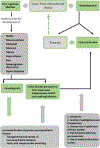Psychosocial Basis of Human Sufferings and Poverty in Patients with Neurological and Psychiatric Disorders
- PMID: 37641666
- PMCID: PMC10461571
- DOI: 10.18103/mra.v11i5.3919
Psychosocial Basis of Human Sufferings and Poverty in Patients with Neurological and Psychiatric Disorders
Abstract
Neurological disorders and psychiatric ailments often lead to cognitive disabilities and low attainment of education, pivoting misconceptions, myths, and misbeliefs. Poverty and low educational attainment are intriguingly associated with poor awareness and perception of these diseases that add to the suffering. Poverty goes parallel with a low level of education and is intricately associated with neuropsychiatric ailments, which have the potential to spread transgenerationally. Robust education policies, proper government rules and regulations against the spread of disease-related myths and misconceptions, uplifting medical education in its true sense, voices against consanguinity, and programs to raise scientific perception about diseases can help to throw light at the end of this dark tunnel. In this article, the authors intend to 1) decipher the potential psychosocial basis of human suffering and poverty in patients with neurological and psychiatric disorders, and 2) discuss the apropos way-outs that would potentially mitigate suffering, and alleviate the economic burden and cognitive disabilities of families with neuropsychiatric diseases.
Keywords: Human Suffering; Neurological disorders; Poverty; Psychiatric disorders.
Conflict of interest statement
We wish to confirm that there are no known conflicts of interest associated with this publication, and there has been no significant financial support for this work that could have influenced its outcome.
Figures
Similar articles
-
Education matters: longitudinal pathways to mid-life heavy drinking in a national cohort of black Americans.Addiction. 2022 Aug;117(8):2225-2234. doi: 10.1111/add.15882. Epub 2022 Apr 3. Addiction. 2022. PMID: 35320593 Free PMC article.
-
Poverty and severe psychiatric disorder in the U.S.: evidence from the Medical Expenditure Panel Survey.J Ment Health Policy Econ. 2012 Jun;15(2):83-96. J Ment Health Policy Econ. 2012. PMID: 22813941
-
[Awareness disorders in Alzheimer's disease and in mild cognitive impairment].Encephale. 2014 Apr;40(2):180-7. doi: 10.1016/j.encep.2013.10.003. Epub 2014 Mar 11. Encephale. 2014. PMID: 24630532 Review. French.
-
Prevalence and risk factors for neurological disorders in children aged 6 months to 2 years in northern India.Dev Med Child Neurol. 2013 Apr;55(4):348-56. doi: 10.1111/dmcn.12079. Epub 2013 Jan 30. Dev Med Child Neurol. 2013. PMID: 23363431
-
[What support of young presenting a first psychotic episode, when schooling is being challenged?].Encephale. 2017 Dec;43(6):570-576. doi: 10.1016/j.encep.2017.10.001. Epub 2017 Nov 8. Encephale. 2017. PMID: 29128195 Review. French.
References
Grants and funding
LinkOut - more resources
Full Text Sources

